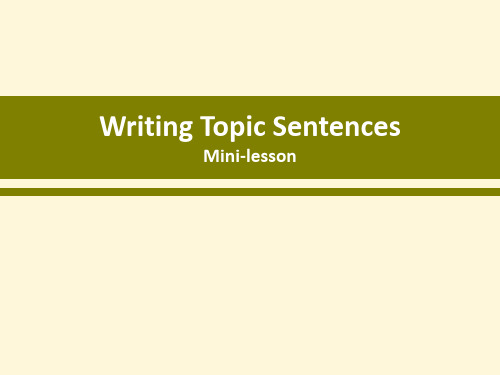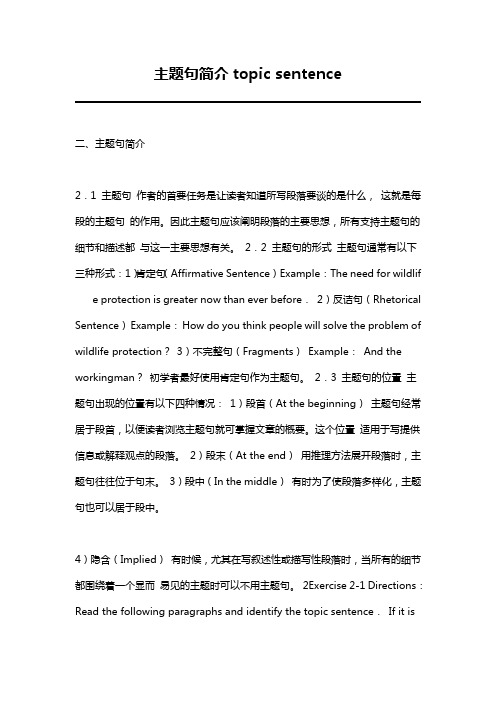Topic sentence
- 格式:docx
- 大小:14.52 KB
- 文档页数:1


“Topic sentences”的意思是“主题句”,它是一个段落或文章的中心思想的概括性句子。
主题句通常出现在段落的开头,有时也可能出现在段落的中间或结尾。
主题句的作用是向读者明确段落或文章的主要内容和重点,它可以帮助读者快速理解段落或文章的主旨。
主题句通常简洁明了,能够概括段落或文章的核心观点或主题。
在写作中,使用主题句可以使文章结构更加清晰,逻辑更加连贯。
通过主题句的引导,读者可以更容易地跟上作者的思路,并理解文章的整体框架。
同时,主题句也为段落或文章的其他句子提供了一个框架和指导,确保它们都与主题相关并支持主题的阐述。
以下是一个主题句的示例:
“化石记录显示,恐龙在大约6,600 万年前灭绝,为哺乳动物的崛起铺平了道路。
”
在这个例子中,主题句明确了段落的主要内容,即恐龙的灭绝以及它对哺乳动物崛起的影响。



主题句简介topic sentence二、主题句简介2.1 主题句作者的首要任务是让读者知道所写段落要谈的是什么,这就是每段的主题句的作用。
因此主题句应该阐明段落的主要思想,所有支持主题句的细节和描述都与这一主要思想有关。
2.2 主题句的形式主题句通常有以下三种形式:1)肯定句(Affirmative Sentence)Example:The need for wildlife protection is greater now than ever before.2)反诘句(Rhetorical Sentence)Example:How do you think people will solve the problem of wildlife protection?3)不完整句(Fragments)Example:And the workingman?初学者最好使用肯定句作为主题句。
2.3 主题句的位置主题句出现的位置有以下四种情况:1)段首(At the beginning)主题句经常居于段首,以便读者浏览主题句就可掌握文章的概要。
这个位置适用于写提供信息或解释观点的段落。
2)段末(At the end)用推理方法展开段落时,主题句往往位于句末。
3)段中(In the middle)有时为了使段落多样化,主题句也可以居于段中。
4)隐含(Implied)有时候,尤其在写叙述性或描写性段落时,当所有的细节都围绕着一个显而易见的主题时可以不用主题句。
2Exercise 2-1 Directions:Read the following paragraphs and identify the topic sentence.If it isimplied,summarize it yourself.(1)But no matter what it is called,all polyester has certain good points.It does not wrinkle easily.It dries quickly after it is washed.It holds its shape.It is strong and keeps its colors well.Topic Sentence:____________________________________________ Position:________________ (2)Black is the colour of mourning.Red symbolizes danger,violence,or bloodshed.If you are afraid,you are yellow.None of these sayings is true outside the English speaking world.In China and Korea,white is the color of mourning.In Russia red stands for beauty and life.In Italy and Germany you are yellow with anger,not with fear.Topic Sentence:_____________________________________________ Position:__________________(3)Our chief source of fresh water is rainfall that collects in lakes,rivers,and reservoirs.Recently,however,we have discovered anew source,aquifers,which are rock formations containing water.Even under deserts,vast aquifers may be waiting to be tapped.Companies drilling for oil in the Middle East have sometimes struck aquifers,which provide unexpected water supplies for arid regions.Topic Sentence:____________________________________________ Position:_____________(4)Suppose you’re playing a game.You make a silly mistake and lose.Do you become angry?Or can you laugh at yourself and hope to do better next time?Suppose you are at a special dinner.You accidentally spill some food.Why keep worrying about how clumsy you look?Why not laugh it off and enjoy yourself anyway?If you can,it’s good sign you've really grown up.Topic Sentence:____________________________________________ Position:____________(5)Young men sometimes bring edelweiss back for their girlfriends.The girls think of the flowers as a proof of true love.Mountain climbers,guides,and hunters pick edelweiss too.They wear it on their hats.Tothem it is a sign of courage and daring.Topic Sentence:____________________________________________ Position:___________三、如何写好主题句3.1 关于写主题句的建议1)要写合乎语法的句子Example 1:Two causes of the American Civil War.这个句子是个不完整的句子,不合乎语法,因此不能用作主题句。

英语写作中的主题句在英语写作中,主题句是一个非常重要的概念,能够帮助读者更好地理解文章的主题和结构。
本文将介绍主题句的定义、作用和写作技巧。
下面是本店铺为大家精心编写的5篇《英语写作中的主题句》,供大家借鉴与参考,希望对大家有所帮助。
《英语写作中的主题句》篇1一、主题句的定义主题句是英语写作中的一个重要概念,指的是每个段落的第一句话,用于概括该段落的主题和内容,同时为读者提供指引,让他们更好地理解文章的结构和主题。
主题句通常是一个简明扼要的句子,它应该清晰地表达出该段落的主题和重点。
二、主题句的作用主题句的作用非常多,主要包括以下几个方面:1. 概括段落内容:主题句应该能够概括该段落的主要内容,让读者对该段落的主题有一个清晰的了解。
2. 指引读者:主题句应该能够为读者提供指引,让他们更好地理解文章的结构和主题。
通过阅读主题句,读者应该能够了解该段落在整篇文章中的位置和作用。
3. 突出重点:主题句应该能够突出该段落的重点,让读者更好地理解文章的重点和主旨。
三、主题句的写作技巧写作主题句需要掌握一些技巧,主要包括以下几个方面:1. 简明扼要:主题句应该简明扼要,不要使用过多的词汇和复杂的句子结构。
2. 突出重点:主题句应该突出该段落的重点,不要包含太多无关的信息。
3. 与文章内容相呼应:主题句应该与文章内容相呼应,不要出现矛盾或不相关的内容。
4. 避免使用结论性词语:主题句应该避免使用结论性词语,如“因此”、“所以”等,因为这些词语可能会误导读者对该段落的理解。
英语写作中的主题句是一个非常重要的概念,能够帮助读者更好地理解文章的主题和结构。
《英语写作中的主题句》篇2英语写作中的主题句是指在文章或段落中,用来表达主题或中心思想的句子。
主题句通常出现在文章或段落的开头,用于引入和概括后续内容。
在写作中,主题句的运用可以帮助读者更好地理解文章结构和主题,同时也可以帮助作者更好地组织文章思路。
一个好的主题句应该具有以下特点:1. 简洁明了:主题句应该用简短的语言表达出文章或段落的主题,不宜过于复杂或冗长。
主题句(topic sentence)是表达段落主题的句⼦。
它⽤以概括段落⼤意,要求全段其他⽂字都围绕它展开。
请看下例: My mother has passed along to me certain rules for getting along with others. Don't argue with parents; they will think you don't love them. Don't argue with children; they will think themselves victimized. Don't argue with spouses; they will think you are a tiresome mate. Don't argue with strangers; they will think you are not friendly. My mother's rules, in fact, can be summed up in two words: Don't argue. 主题句中提出的 "certain rules" 指的是什么?展开句中通过四个 "Don't argue --" 逐⼀加以交代。
从结构来看,这是⼀个⽐较典型的段落,它包括了主题句,推展句和结论句(即本段中的末句)。
1.1 主题句的位置 主题句通常放在段落的开端,其特点是开门见⼭地摆出问题,然后加以详细说明。
其作⽤是使⽂章的结构更清晰,更具说服⼒,便于读者迅速地把握主题和想象全段的内容。
主题句可以放在段中起到承上启下的作⽤,或放在段尾起概括全段的作⽤。
但初学者⽐较难于掌握,因⽽在四级考试中,考⽣应尽量采⽤将主题句放在段落开头的写作⼿法。
, 例1: Our life today depends very much on energy. In towns and in villages, on farms and in factories, machines have made life easier than it used to be. The machines use energy, and energy is needed for heating, lighting, communications, carrying goods -- everything. Factories and industrial plants use a great deal of energy to make the things that we use and buy and sell., 这段⽂字所讲的主要是能源问题。